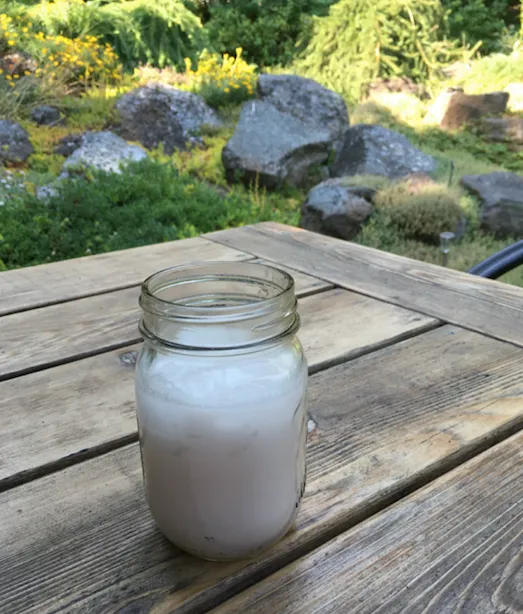
Sea Change
(No that’s not milk, scroll to bottom of article for explanation. Yes, gardens on the “farm” in the background!)
It’s just possible that the scientific world is shifting its paradigm of understanding metabolic disease.
That’s a cumbersome mouthful, but what I really want to say is that I’ve been collecting research links for the last couple months, wanting to write something, but have been overwhelmed almost daily with new findings that just have to be included. Taken as a whole, however, the research points in one very reassuring direction: research is confirming what anecdote has suggested.
Insulin and Metabolic Syndrome
Elevated insulin and blood sugar are key components of metabolic syndrome. It seems more widely accepted that restricting the food that causes both of those (i.e., carbohydrates, a move which seems obvious, but hasn’t been) is proving to be the best way to reverse them. Not just calorie restriction or weight loss or changing out good fats for bad (and all of those help), but actually restricting calories from carbohydrates seems to make the biggest difference when you want to:
- Reverse insulin resistance
- Lower persistently elevated blood sugar
- Shrink excessive abdominal girth
- Cure non-alcoholic fatty liver disease
At the same time there has been recognition that insulin resistance seems to be at the heart of many disease of modern civilization. The same dietary restrictions (low carb) that reverse insulin resistance also appear to:
- Lower blood pressure
- Reverse hyperglycemic, hyperinsulinemic cognitive decline
- Reduce cluster headache pain
- Lower cancer risk
- Normalize metabolism in PCOS (Polycystic Ovarian Syndrome)
- Improve athletic performance
- Improve control and outcome in both type 2 and even type 1 diabetes
Let’s just look at a few
Cluster headaches are notoriously difficult to treat: named for their tendency to cluster in time (many headache attacks in a cluster lasting for weeks or months) and in location (on one side of the head), they may be gone for months at a time only to recur unexpectedly. Many patients are drug resistant or intolerant of conventional treatment. Having observed that typical migraines respond well to ketogenic dietary intervention, a group of neurologists found similar results when they extended the diet to cluster headache patients. 19 patients completed a very low carbohydrate (10 and then up to 30 grams of carbs a day) alone or in addition to drugs that had failed them before; of the 19, 15 responded well. 11 had full resolution of the headache, and the other 4 noticed approximately 50% reduction in headache pain. (Confirming my oft-repeated phrase that “OUR BRAINS LOVE KETONES”!!) You can read this open access study from Italy here
Type 2 diabetes is responding well to low carb interventions, both in a “virtual” setting at Virta Health, and in separate trials, such as this moderately low-carb intervention with type 2 diabetic patients in Japan (full text available here), and in physician offices everywhere!
Cognition! Certainly the area that is foremost in my practice currently is the awareness that
- High sugar and insulin increase the risk of dementia through a disastrous increase in brain-based insulin resistance, discussed here .
- A low carb ketogenic diet improves cognitive performance, discussed here, and in a full article here.
- Even without a truly ketogenic diet, ketone production via MCT supplementation, enhances cognition, discussed here.
- A low carb ketogenic diet improves cognitive perf Even without a truly ketogenic diet, ketone supplementation enhances cognition, discussed here
Because OUR BRAINS LOVE KETONES!
Meanwhile, back at the farm…
So it’s a smoky, late afternoon slump around here, and I hear that brains love ketones. What’s a good way to get them?
- Three hours ago when I ate lunch, I could make sure I didn’t eat much in the way of carbohydrates and that I DID eat adequate fats (avocado, olive oil, meat). Hmm, hasn’t helped as much as I’d like.
- If it were a chilly day, I’d heat up some broth and stir in some MCT oil, blend it up a bit. (Medium chain fats, derived from coconut oil, super-charge the liver to make ketones for circulation to the brain!)
- But it’s warm and the air is heavy: I need cold ketones. I could just take a spoonful of MCT oil (tends to irritate my throat a bit) or my solution of choice: in a pint jar, mix close to a pint of water with half a NUUN electrolyte tablet and 1 tablespoon of Perfect Keto Unflavored MCT powder.
If this article ever gets posted on my website, it’s because the above recipe worked! (I also use it as a hydration liquid when I’m exercising outside, which I won’t be doing again til the wind shifts.)

